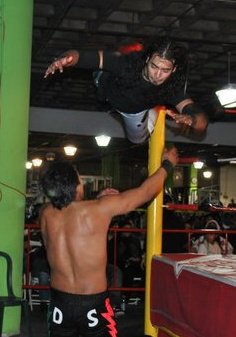
Like Santiago, Jorge Kebrada grew up in Brooklyn dreaming of becoming a pro wrestler. He begged his parents to send him to a training school. They suggested he try boxing instead. He arrived at age 15 at Gleason’s, and was a knot away from lacing up the gloves when he noticed one of the rings wasn’t like the others.
“I saw a ring with three ring ropes – not four. I knew right away it was a wrestling ring,†said Kebrada. “A few minutes later, I met Johnny Rodz and after a few hours, everything was set. It was one of the greatest moments of my life.â€
Born in Mexico and raised in Brooklyn, the 20-year-old Kebrada is a walking duality. Kebrada incorporates his Mexican heritage and U.S. upbringing into his career as the masked luchador Eclipse Beltran. Combining the high-flying moves his countrymen have made famous with the fast-paced and stiff American style Rodz taught him makes Kebrada unique. In five years, he has wrestled in various independent promotions across the country.
But, in a twist out of a wrestling storyline, Beltran recently stopped training with Rodz and moved back to Mexico to live his fantasy of performing in the same arenas he marveled at as a child glued to Telemundo. He hasn’t been able to catch on with a major promotion there. Like Santiago, he has all the moves, but is still working on his character. He’s not discouraged.
“After every match, everything is sore. You get bumps and bruises, but that’s part of the game. Plus, once your music hits and you walk to the ring, all your pain goes away. It’s that type of rush. You forget about everything,†Kebrada said. “Sometimes it comes to my mind – why I would do this to myself for other people’s amusement? I try not to think about it like that, though. My heart is always pumping knowing that I can do this because I’ve wanted to do it since I was five. This is what I wanted. This is really big for me.â€
Indie promoters use wrestlers’ willingness to do whatever it takes to get ahead to their advantage. They don’t know who is going to be the next superstar. Fans are fickle. Promoters preach the perception of perfection. Their wrestlers perform at a frenetic pace to satisfy the crowd and increase their odds of moving up. Money is everything.
“It’s not about how many flips you can do or who you’re married to,†said former WWE wrestler Michael Tarver. “If you can’t draw money, or they don’t think you can, you won’t work anywhere.â€
Promoters don’t quite put it that way.
“Everyone pays their dues in different ways,†said Gabe Sapolsky, vice president of Dragon Gate USA and founder of Evolve, two young independent promotions in the Northeast. “You have to make yourself valuable. Bookers want to know what you can do for them. When I started, there wasn’t anything I wouldn’t do. You have to be marketable and be able to add something to a promotion.â€
Survival in the business is more about brains than brawn. Most of the time, the indie guys make decisions very quickly. They’ll wrestle almost anywhere, against anybody to keep getting work. The situations can get dangerous.
When Kebrada was 17 and enjoying his first taste of success, getting booked in matches all over the Northeast, he was put up against a backyard wrestler in New Jersey. The guy was green and known for taking risks. Beltran was not interested in letting this clown mess with his livelihood.
“We started planning our match. After five minutes of him talking, I could tell he was a backyard guy,†he said. “He wanted to do all these elaborate moves, all at once. It made no sense. The bottom line is good wrestling looks real and doesn’t hurt you.â€
Some wrestlers ignore their instincts. After all, this could be the match that gets them noticed. There could be an agent in the crowd. But that night in New Jersey, Kebrada put his safety first.
“I really wanted to see his gear. He came back like 10 minutes later and I saw he was wearing Nikes and basketball shorts to the ring. There was no way I was going to do half the things he wanted to do after that,†Kebrada remembered. “He was clearly insulted, but we ended up doing a pretty standard match. Even that wasn’t too good. He wasn’t a good worker. Everything looked clumsy. However, no one got hurt. I was able to go home in one piece. That’s what it’s all about. One bad match with a backyard wrestler isn’t going to kill me. Having him do a move the wrong way will.â€
Kebrada got paid $50 that night – he doesn’t make quite that much per match in Mexico, these days. The most Santiago has earned in a night is $125, despite working all over the country and in the famous ECW arena in Philadelphia. The money often goes right back into training, masks, boots, tights, food, travel and hotels.
You can read the other parts of the story by clicking here.


Leave a Reply